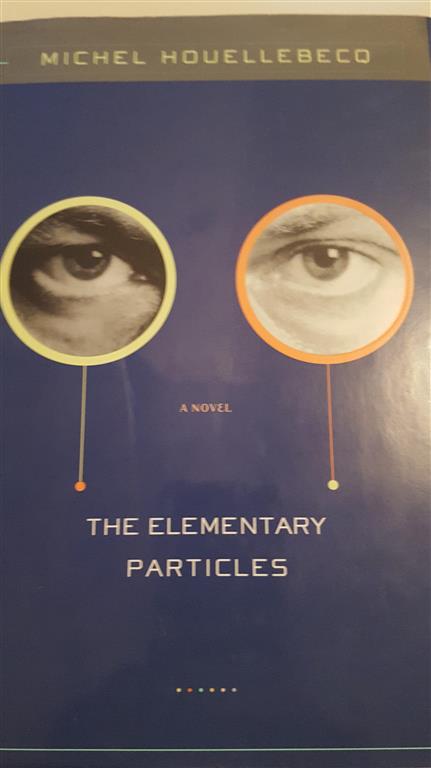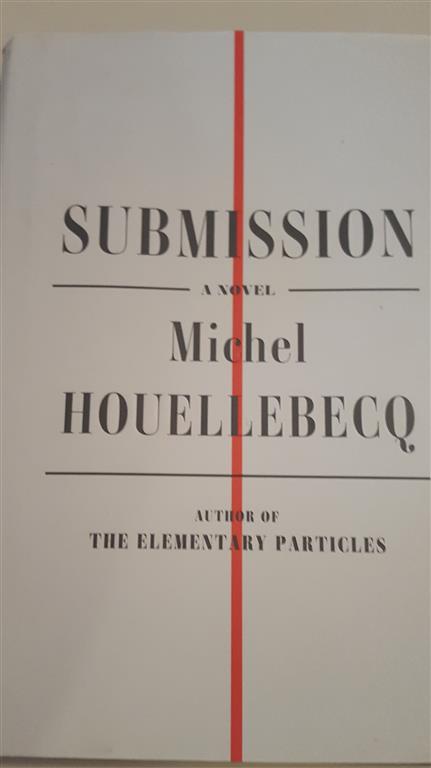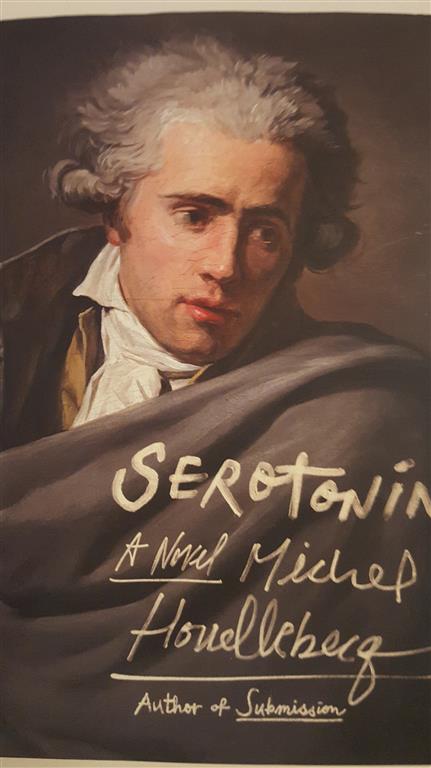The novels
I resisted reading The Elementary Particles when its translation came out at the start of our new millennium. Les particules élémentaires by Michel Houellebeqc was published in 1998 to excited reviews by the chattering classes, most praising, a few condemning this new star on the French literary horizon. But all agreed it was drenched in sex of various permutations, and that turned me off any desire to read this new phenomenon. Two more novels by Houellebeqc followed, Submission in 2015 and Serotonin in 2019, and I remained a sceptic.

I am always searching for good books, and literature is my first choice—the novel can explore what it is to be human better than any other medium, à mon avis. Houellebeqc’s books were touted as serious novels in an era where good fiction is hard to find, so they should have been high on my list. But it was not until I read a review in Commentary that I stopped resisting and bought all three.
The review
“Better than any other author he describes certain human predicaments in the global age,” Christopher Caldwell writes. And because sex permeates our modern world, Houellebeqc sex-drenched stories reflect this sordid landscape. His bleak depiction of modern man paints a compelling picture of life in the 21st-century West, and condemns the progressive vision that has led us here.
Talk about timely. I began The Elementary Particles in the spring, and then read Submission and Serotonin in the summer—a summer aflame with the pandemic and the rioting, looting, burning & killing by progressives led by BLM and Antifa. Even Houellebeqc would be taken aback at the nihilism, hatred and destructiveness on display by the Left, I believe.
The Elementary Particles
The horror of heedless parents. Before the story plunges into the horror of heedless parents focusing on their own pleasure and grossly neglecting their children—Michel & Bruno have the same mother, a ‘60s hippie in all her narcissistic ugliness and sexual promiscuity, and different fathers, who match each other in self-absorption, one pursuing sex and the other his professional life making documentaries—the narrator observes, “It would be fair to say that the late 1950s and early 1960s were the golden age of romantic love.”
The age of romantic love. Having come of age in that period, I agree: My husband and I met at university, chose each other without familial influence, and pledged our troth to each other and to the community in marriage. I registered for university at 9am and was married at 4pm in the chambers of Judge Mary Batten, the first female judge in Saskatchewan.
The overindulged and underparented children. We had the quaint notion that living together required marrying, a concept that younger generations find quite shocking as divorces mount and children are overindulged and underparented. And we were radically out of step with our contemporaries in the ’60s, thank god!

Grandmother as mother & father. In this dismal scenario, Michel was lucky. Yes, his parents abandoned him, but he had a grandmother who became his mother and his father. Her commitment was solid and would continue until her death. “Historically, such human beings have existed. Human beings who have worked—worked hard—all their lives with no motive other than love and devotion, who have literally given their lives for others, out of love and devotion; human beings who have no sense of having made any sacrifice, who cannot imagine any way of life other than giving their lives for others, out of love and devotion.” A description a little extravagant for a parent, perhaps, but in the essentials of love and devotion, true.
Bruno, too, had a grandmother who became his parents. She was an immigrant who was old and sick and poor, who never got over the desertion of her daughter. “Deep down, Bruno’s grandmother felt certain there was a mistake. Someone, somewhere had made a dreadful mistake.” But she carried on for five years, raising the boy in spite of her perplexity, illness and unease about the state of her daughter’s affairs. When she died, Bruno’s parents sent him off to a boarding school, and brutal bullying began.
Dismal childhood. And there we have the dismal, but not uncommon, boyhood of Bruno & Michel in the ‘let it all hang out’ decade of the 1960s. One was fortunate to have a strong, devoted grandmother rescue him from careless parents; the other, alas, was unfortunate to have a grandmother with neither the resources nor health to raise him to adulthood. “A subtle but definitive change has occurred in Western society during 1974 and 1975… Western society had tipped toward something dark and dangerous… Physical violence, the most perfect manifestation of individuation, was about to reappear.”
Despairing adult. Bruno’s life becomes one long ejaculation of sperm and despair until he meets Christiane, another victim of narcissistic parents. “My idiotic parents were part of the same liberal, vaguely beatnik movement as your mom was in the late fifties,” she tells Bruno. “I have nothing but contempt for them, in fact I hate them. They’re evil—everything they’ve done is evil…” Sadly, she’s too damaged to overcome their evil, and lives her life in a constant pursuit of sex in as many permutations as are bodily possible. At least now she has a partner in the dance of sexual decadence, if one can grasp at straws of redemption.
Degrading civilization. Houellebeqc continues his relentless documentation of the degradation of Western civilization, and he ends with a sci-fi conclusion that bores the hell out of me, as most sci-fi conclusions do. How very French of him! But I say, “Be brave and tackle the problems we have with the resources we have, instead of conjuring up an alternative universe where these problems are no more.” How very English of me! And the English win wars while the French pontificate.
Submission
Best part of life is over. The narrator finishes his doctoral dissertation and “…realizes that part of my life, probably the best part, was behind me.” That gloomy sentiment, which he thinks is true of students in Western democracies, sets the bleak tone for the story. His field is literature, “the major art form of a Western civilization”, which he sees ending in our postmodern world.
Only literature can connect us. I agree that “only literature can put you in touch with another human spirit, as a whole, with all its weaknesses and grandeurs, its pettinesses, its obsessions, its beliefs, with whatever it finds moving, interesting, exciting, or repugnant.” He despairs of teaching literature to today’s students because “the transmission of knowledge was generally impossible, the variance of intelligence extreme, and that nothing could undo or even mitigate this basic inequality.” Thus, he goes on his gloomy way, with his gloom justified by the daily asininities of the ascendant left.
Lefties trash bourgeois values. In their relentless march of ‘progress’, lefties trash all the bourgeois values underpinning Western civilization and attempt to replace them with anarchic garbage. The only comfort for us bourgeoisie, the author posits, is that we still had books to read, at least temporarily, to block out our despair.

Lefties trash the Western canon… Whoa, Houellebeqc, even this tiny ray of sunshine amid the gloom is being blocked as the leftie academy busily trashes the canon of great writers. In a brilliant essay by Mark Helprin in The New Criterion, he shows this is already well underway in September 1988. Leading universities, Stanford prominent among them, begin replacing the traditional greats—because most are dead, white men, certainement!—with “women, minorities, and people of color”. Why? Because a minority insisted this was only fair, and the majority must yield—and pay for—the minority’s demands.
…and replace it with true trash. And what trash it is. “Why are so many minimalist stories about despicable people in filthy unkempt apartments filled with ugly bric-a-brac, where everyone smokes, drinks, stays up all night, and is addicted to coffee? Why are all the characters almost uniformly pudgy, stiff, and out of shape, even if they are in their twenties? Why do they watch so much television? Why do they have so many headaches? Why are they impotent, frigid, promiscuous, or all three combined?… Why are almost all of them divorced, never married, or, if married, remembering, having, or about to have an affair? Why is their hair dirty? Why don’t they work at a profession or a trade?” And Helprin goes on in his devastating condemnation of so much of what passes for literature nowadays. No wonder my search for a good novel always leaves me disgusted with the current crop, and I return to the ‘canon’ of writers before postmodernism.

Sex without commitment dominates the social narrative. Submission’s narrator reflects his generation’s contempt for commitment and obsession with sex, focusing on its immediate physical pleasure to the exclusion of all else. With that the centre of his universe, it is no wonder despair threatens to engulf him as he grows older and begins to sag. Couple that with his vision of women as the sum of their physical parts, and their inevitable sagging, and it is not surprising how devoid of meaning his life becomes. He is a product of the times, times in which truth, facts, beauty, love—all the values of our enlightened civilization—are being rejected with the push to replace the individual responsible for his/her choices with the tribal identity ruled by the collective.
The banality of sex for sex’s sake. Sex for sex’s sake is so bland in our brave new world that all the detailed descriptions of it elicit mild arousal at best, yawns at worst. But the critics’ knives come out when leftist dogma is questioned, when the narrator states a fact: Patriarchy existed and “as a social system it was able to perpetuate itself.” Another fact that upsets the progressive applecart is religion: “that couples who follow one of the three great religions of the Book and maintain patriarchal values have more children than atheists or agnostics.” Ironically, the falling birthrate in the Western world means progressives soon won’t have to worry about white dominance—or fragility as Robin D’Angelo is now making a mint off shilling to self-flagellating social-justice warriors—because all traces of it will be subsumed into the diverse multicultural soup.
And the Muslims take over. Which brings us to the Muslim takeover of France, peacefully, but inexorably. Muslims care about “the birthrate and education… If you control the children, you control the future.” The place of women in their society is “exactly the opposite of Western women, who spend their days dressed up and looking sexy to maintain their social status, then collapsed in exhaustion once they got home.” Muslim women, in contrast, spend their days sequestered in the home with their children, and then dress provocatively for their husbands when they return from work.
No ‘there’ there in his resistance. The narrator resists the Muslim takeover a little, but there’s no ‘there’ there in his resistance. When Christianity was at its zenith in the Middle Ages in the West, it, too, was based on a patriarchal structure with the Virgin Mary as the symbol of womanhood. With no strong family bonds to direct him and the lure of young wives at his command, especially sexually, he submits. “Muslim women were devoted and submissive, that much I could count on, it’s how they were raised, they aimed to please.”
So much for being a professor of literature, a keeper of the flame of enlightened Western values, so easily seduced by the promise of female sexual compliance at one’s command.
Serotonin
Loser men. Now I am tired, tired of reading about loser men who are endlessly fascinated by their male apparatus and their claim that so, too, are all men since time immemorial, amen. And his lover, Yuzu, is the most disgusting piece of womanhood one can imagine. She is a void waiting to be filled with semen in every orifice she has, totally repugnant and hardly human. In fact, I have never encountered anyone remotely like her, but Houellebeqc would probably put that down to the sheltered life I’ve led. So be it.
Empty life. This narrator takes fear of commitment to a whole new level, agonizing over his empty life for pages and pages. Finally, half way through this 309-page book, he has an insight about the true love of his life. Perhaps he should have asked Camille to “give up her studies and become a housewife, my wife in fact” and she probably would have said yes. “But I didn’t, and I probably couldn’t have done; I hadn’t been formatted for such a proposition, it wasn’t part of my software; I was a modern man, and for me, like for all my contemporaries, a woman’s professional career was something that had to be respected above all else … it was the absolute criterion, it meant overtaking barbarism and leaving the Middle Ages.”
Oh, woe, to humankind that such a sentiment should dominate the culture in our postmodern world!

Another insight: “it’s amazing how quickly men let themselves go. I had noticed the previous day that Aymeric’s clothes were frankly filthy, and that they smelled a little;” This is especially true, in my experience, when the man has been living with a woman, and then she is no longer there. In this case, Aymeric’s wife has left him for another man—quelle surprise, eh, in this world that scorns bourgeois values—and away from the hard life of a family farm in the age of globalization.
And his skewering of the greenies is spot on: “nature left to its own devices generally produces nothing but a shapeless and chaotic mess, made up of various plants, and is as a whole quite ugly” and “deer, like most wild animals, are opportunistic omnivores and will eat more or less anything, nothing brings them more joy than happening upon the leftovers of a picnic or a disembowelled bin bag”.
But not so spot on, in my opinion, is his assessment of man as a creature for which nothing matters but youth and beauty. Naturally, saturated in sex. He cites in proof two literary giants of the early 20th century: Thomas Mann eschewed “all intellectual and moral qualities, and in which, at the end of the day, he too, without the slightest restraint, had abjectly wallowed” in youth and beauty with its pervasive promise of sex; Marcel Proust, too, needed “not intellectual conversations, contrary to popular belief, but ‘light affairs with young girls in bloom’.” In rebuttal, I quote Houellebeqc himself in the unknowability of another human being: “It’s hard to understand other people, to know what’s hidden in their hearts” (Submission, page 139). Ergo, his statements about Mann and Proust are opinion, not fact.
I did get a laugh in the chronicle of this dreary man’s dreary life: “he was a little withered old man somewhere between the ages of seventy-five and eighty.” My age exactly, and by the evidence of the author’s photo and mine, the author resembles “a little withered old man” much more than I the female version. Monsieur Houellebeqc is 12 years my junior.
Time for some light amid the gloom

I’m glad Caldwell’s review prompted me to read Houellebeqc, and I’m glad I read his three novels. But there is no joy in Houellebeqcville because mighty Western man has struck out. His chronicle of how we got to where we are is deeply insightful, and he would be justified in saying, “I told you so,” as the enemies of Western civilization loot and riot and burn in the summer of 2020.
But I think the game’s still in progress. Yes, joy and liberty are down a few strikes, but we still have innings to go with formidable batters and millions of fans on our team.
He’s good, but I’ll put off reading anything else of his for a while to dispel the gloom. For the sake of our health—mental & physical—we must choose enlightened individual freedom & capitalism and fight to the death the darkness of collective tyranny & communism.
